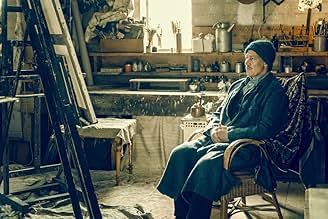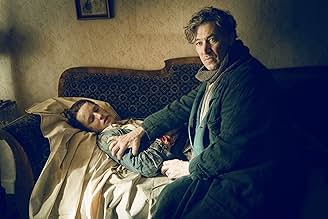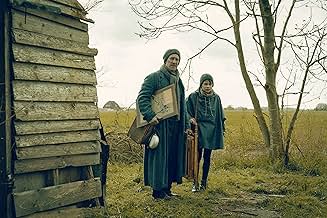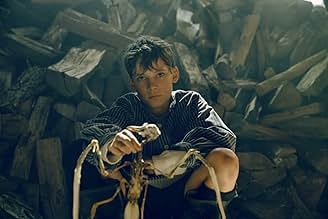Deutschstunde
- 2019
- 2h 5min
CALIFICACIÓN DE IMDb
6.8/10
1.6 k
TU CALIFICACIÓN
Explora la historia de Siggi, quien está en prisión durante el período de posguerra.Explora la historia de Siggi, quien está en prisión durante el período de posguerra.Explora la historia de Siggi, quien está en prisión durante el período de posguerra.
- Dirección
- Guionistas
- Elenco
- Premios
- 3 premios ganados y 5 nominaciones en total
Joachim Regelien
- Hinnerk Timmsen
- (as Jochen Regelien)
- Dirección
- Guionistas
- Todo el elenco y el equipo
- Producción, taquilla y más en IMDbPro
Opiniones destacadas
10Raja79
This is literally one of the most beautifully directed historic movies out there. I cannot believe how underrated this is.
Everything from the pacing to the acting is done very nicely, and the story is also told in a very interesting manner.
It definitely deserves higher ratings!
Everything from the pacing to the acting is done very nicely, and the story is also told in a very interesting manner.
It definitely deserves higher ratings!
I didn't read the original novel, so the story was completely new to me. It is a wartime movie, with a village policeman (initially) forced to prohibit his friend from painting; common practice in Nazi Germany. But the story has many levels: it addresses the conflict of a father/son relationship (with the painter competing for that role) the battle between good and evil (how can any painting be bad for society?), how do we deal with populism in our own age, how can it be that hardened war criminals simply return and continue as before...?
The backdrop of the German coast, with constant rain torturing the characters, complements a very intriguing story that forces the viewer to continue to watch.
Christian Schwochows adaptation of Siegfried Lenz' 1968 landmark novel is a visually striking and competently made movie that sadly misses many subleties that made the story come alive in the first place.
Yes, I have read Deutschstunde not too long ago and was impressed not only by the main story and the quite suspensful thread that runs through it, but also by the honest characterisation of the people of Nordfriesland, their quirks and the subtle description of their beliefs. This was something that was dearly missed here. Of course, several side-characters were omitted from this 2019 movie version, but the main change is that the focus shifts from our protagonist young Siggi, whose thoughts we are told firsthand in the novel, to the depiction of the conflict between his father and the painter Max Ludwig Nansen. And this is where the movie fails: for a story that deals with repressed emotions and the blind need to 'do ones duty', it is played very emotional: there are several instances of flying fists, shooting guns, screaming and crying to the point where it becomes a bit unbelievable. Also, because of the neglect of the highly complex character of Siggi as our focus, we can hardly understand the change he goes through and his actions at the end of the movie can become confusing. This criticism would not be so hard if the movie would try to introduce something new to the story instead of simply retelling the main points and staying closely beneath the surface.
Still there are strong points. The visuals of the raw northern german shoreline are beautiful, but not to the point where some movies lose itself in neverending elegic drone-footage. It is presented more like another character here and this is exactly what this movie needs. Also, some praise must go to Tobias Moretti who as the strong-willed Nansen makes us believe in the need to paint and what it means not only to him but everyone around him. He is the main reason that Deutschstunde is still recommendable and doesn't quite fail as a competent adaptation of one of the most iconic german novels of all time.
Yes, I have read Deutschstunde not too long ago and was impressed not only by the main story and the quite suspensful thread that runs through it, but also by the honest characterisation of the people of Nordfriesland, their quirks and the subtle description of their beliefs. This was something that was dearly missed here. Of course, several side-characters were omitted from this 2019 movie version, but the main change is that the focus shifts from our protagonist young Siggi, whose thoughts we are told firsthand in the novel, to the depiction of the conflict between his father and the painter Max Ludwig Nansen. And this is where the movie fails: for a story that deals with repressed emotions and the blind need to 'do ones duty', it is played very emotional: there are several instances of flying fists, shooting guns, screaming and crying to the point where it becomes a bit unbelievable. Also, because of the neglect of the highly complex character of Siggi as our focus, we can hardly understand the change he goes through and his actions at the end of the movie can become confusing. This criticism would not be so hard if the movie would try to introduce something new to the story instead of simply retelling the main points and staying closely beneath the surface.
Still there are strong points. The visuals of the raw northern german shoreline are beautiful, but not to the point where some movies lose itself in neverending elegic drone-footage. It is presented more like another character here and this is exactly what this movie needs. Also, some praise must go to Tobias Moretti who as the strong-willed Nansen makes us believe in the need to paint and what it means not only to him but everyone around him. He is the main reason that Deutschstunde is still recommendable and doesn't quite fail as a competent adaptation of one of the most iconic german novels of all time.
Wonderful story of family ties that get untied due to an overachieving Nazi father who values duty more than his own blood. Very well played by all main cast and beautifully shot. On a side note we see how (too) many Nazis remained in power after the War. The protagonist is torn between his love for art and the pain his father causes, so the spectator feels for him as he seems to lose his mind.
I didn't get into the film because I couldn't understand the concept of banning art. The visuals and the scenery are beautiful though.
¿Sabías que…?
- TriviaThe second adaptation of Siegfried Lenz's novel with the same title, published in 1968 in Germany. The first adaptation was in Deutschstunde (1971).
- Citas
Jens Ole Jepsen: And what did the painter do?
Siggi Jepsen: He taught me.
Jens Ole Jepsen: What did he teach you?
Siggi Jepsen: How to paint pain.
- ConexionesFeatured in Ringlstetter: Die 100. Sendung (2019)
Selecciones populares
Inicia sesión para calificar y agrega a la lista de videos para obtener recomendaciones personalizadas
- How long is The German Lesson?Con tecnología de Alexa
Detalles
- Fecha de lanzamiento
- País de origen
- Idiomas
- También se conoce como
- The German Lesson
- Locaciones de filmación
- Productoras
- Ver más créditos de la compañía en IMDbPro
Taquilla
- Total a nivel mundial
- USD 1,152,502
- Tiempo de ejecución2 horas 5 minutos
- Color
- Relación de aspecto
- 1.85 : 1
Contribuir a esta página
Sugiere una edición o agrega el contenido que falta

Principales brechas de datos
By what name was Deutschstunde (2019) officially released in Canada in English?
Responda
![Ver Trailer [OV]](https://m.media-amazon.com/images/M/MV5BYjJmMmEzYWEtZWQ5Zi00ZTAzLThiYjctZmJjNzA2MjEwOWI0XkEyXkFqcGdeQXRyYW5zY29kZS13b3JrZmxvdw@@._V1_QL75_UX500_CR0)































